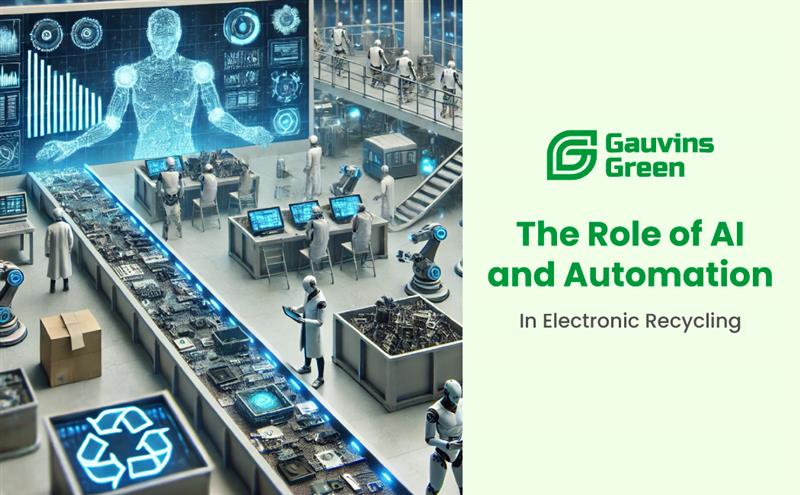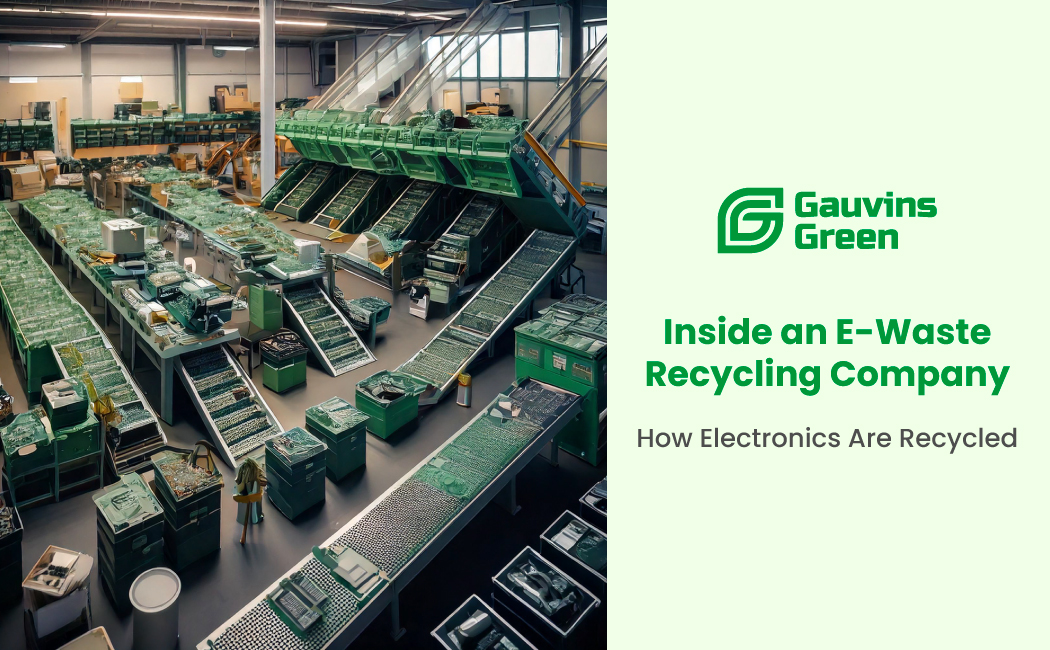As large volumes of e-waste are dumped in landfills and their lead and cadmium seep and contaminate our groundwater, a plant catches fire, and the air becomes dust-ridden with harmful dioxins and furans. Raw material from its remaining state to produce a new bulk of electronics has high carbon emissions, and e-waste recycling mitigates these by many folds, definitely bringing a future full of zero waste to Horizon.
At Gauvins Green, we are working towards a future of sustainable development through responsible e-waste management and a culture of environmental accountability.
Understanding E-Waste and Its Environmental Impact
What is E-Waste?
E-waste refers to discarded electronics like old phones, computers, televisions, and household appliances. Think about every year, we make more than 50 million tonnes of this tech trash, than other kinds. Throwing away old tech isn’t just bad because it wastes resources.
The Climate Connection
Not dealing with e-waste correctly leads straight to climate change. Electronics in landfills give off harmful stuff and gases that heat our planet. Like this:
- Heavy metals such as lead and cadmium leach into soil and water sources.
- Burning plastics in e-waste releases harmful dioxins and furans into the atmosphere.
- The production of new electronics from raw materials involves high carbon emissions.
In promoting e-waste recycling, these terrible effects can be reduced and a zero-waste, sustainable future is possible.
Innovations in E-Waste Recycling
Advanced Recycling Techniques
Modern e-waste recycling technologies are revolutionizing the management of discarded electronics.
- Hydrometallurgical processes extract precious metals like gold and silver from circuit boards in an environmentally sensible way.
- Automated shredding and separation systems efficiently segregate materials for reuse.
- Thermal depolymerization helps recover valuable plastics without releasing harmful gases.
Biodegradable Electronics
Emerging innovations in biodegradable electronics are also making waves. Designed to decompose naturally after use, these products significantly reduce the volume of electronic waste. Research into using materials like cellulose and silk protein for circuit boards is paving the way for greener tech.
Case Study: Gauvins Green’s Role
Gauvins Green employs advanced recycling technologies that ensure the safe extraction and disposal of hazardous substances and recuperate reusable materials. Their dedication to innovation is indicative of how sustainable recycling management can be performed.
Community Involvement: Organizing E-Waste Collection Drives
The Importance of Community Action
Community e-waste collection drives are very critical in the quest to tackle the havoc of the e-waste crisis. If the people can be informed about electronics recycling and community throw-aways in easily accessible locations, then there is a greater chance of diverting electronics from landfills to proper recycling facilities.
Creating a Culture of Sustainability
Sustainability begins with awareness. Schools, workplaces, and community organizations can continue to hold e-waste collection drives to include localized efforts. These drives not only allow for proper disposal but also encourage an environmentally conscious mindset among residents.
Interactive Engagement
- Engaging Question:
When was the last time you recycled an old gadget? Could it have ended up polluting the environment?
At Gauvins Green, we partner with communities to host e-waste collection drives that make recycling simple and impactful.
Legislation in E-Waste Management
Advocating for Stronger Policies
An integral part of a sound legislation model is to strictly segregate e-waste from its other counterparts, which includes recycling. If such regulations are not effectively enforced, electronic waste’s mismanagement will keep on posing further threats to ecosystems and aggravating global warming.
European Union Regulations
The European Union took the lead in the WEEE Directive (Waste Electrical and Electronic Equipment), whereby producers are required to manage the entire lifecycle of their products. This serves as a worldwide benchmark for countries willing to tackle the e-waste agenda.
India’s Progress
The E-Waste Management Rules in India mandate that manufacturers have increased producer responsibility to collect e-waste. Gauvins Green works within these frameworks to deliver compliant recycling services.
As individuals, we will advocate for stronger policies and support organizations such as Gauvins Green, which seeks to promote sustainable e-waste management.
Best Ways in Responsible E-Waste Recycling
- Segregation at Source: E-waste must be sought out and separated at the source in order not to cause further contamination with general waste.
- Alliancing with Certified Recyclers: This is for the partnership with organized e-waste companies to ensure proper disposal.
- Awareness of the Consumer: Build market awareness amongst the common populace about the safe disposal of e-waste.
- Corporate Serving: Develop a sustainable policy for recycling e-waste for the companies to participate in e-waste collection programs.
Future Trends in E-Waste Management
Technological Advances
The e-waste recycling future is ‘automated,’ ‘artificial intelligence,’ and ‘machine learning’-a competition in recycling processes.
Sustainable manufacturing
Circular economy principles are being embraced by modern companies and products designed for ease of repair, upgrade, and recycling.
Heightened Consumer Participation
As awareness of recycling grows, demand for greener products as a waste recovery strategy shall grow.
Gauvins Green’s Vision
With a focus on innovation and education, Gauvins Green, e-waste recycling will soon become an everyday action that everyone must do as every household and industry does.
A Path Towards Sustainable E-Waste Management
Responsible disposal encompasses not just ecological health and mitigation of climate change, but also includes the furtherance of recycling technologies, integrating community in recycling, and the establishment of good policies and laws, in framing a waste-free society and sustainable future.
At Gauvins Green, we envision a world where every piece of e-waste is handled with accountability, to create clean air, water, and soil. Together with you, we can combat climate change and protect the planet for future generations.
Ready to make a difference? Contact us today at Gauvins Green to transform e-waste management into a creative and environmentally friendly solution.
General FAQs
Did you know your old phone could contain gold?
Yes, electronics have precious metals like gold and silver—it’s time to recycle that old gadget!
Can e-waste be upcycled into art?
Absolutely! People have made jewelry, sculptures, and even furniture from discarded electronics.
What’s your “e-waste confession”?
Share a gadget you’ve been hoarding forever—maybe it’s time to part ways!
Would you attend a DIY workshop to turn e-waste into home décor?
Imagine creating something cool while saving the planet—yes or no?
How does Gauvins Green ensure environmental safety in e-waste management?
The company partners with certified recyclers and follows eco-friendly practices to minimize environmental harm.
Can individuals contribute to Gauvins Green’s initiatives?
Absolutely! Anyone can participate in collection drives, attend workshops, or responsibly recycle their e-waste through Gauvins Green.



